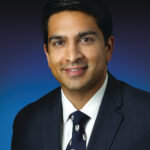Takeaway
As the pandemic continues, I remind myself that my job is to give selflessly to those who are sick. It’s helpful to lean on my team when situations feel especially challenging.

Lifelong learning in clinical excellence | February 3, 2022 | 2 min read
By Souvik Chatterjee, MD, Johns Hopkins Medicine
There are times when it seems that nothing is going your way, and this may feel like one of those times. Omicron at work, omicron at home, omicron in the news, omicron in the air. Some may feel overwhelmed, and many are talking about it, like in this article, “It is Horrific Out There.” As an ICU doctor, I’ve been dealing with COVID in some variant for about two years and completely understand this feeling, which is described by Dr. Schoenthaler with the words, “things are unbelievably terrible out there.”
There are a few strategies that I’ve found helpful. While they may not be universally successful, they’ve allowed me to sustain and keep some smiles behind my mask. Of course, the strategies are aspirational, and I’m just like everyone else, far from perfect, even at following through on my own strategies. I hope these may help you a little bit as the pandemic continues:
Adjust your time scale and engage your memory.
It wasn’t that long ago that I was frightened for the health of my colleagues and family. There were no vaccines or therapies, and little knowledge about transmissibility. I was scared to work and scared to be at home after work. Now I’m vaccinated and boosted, as are my family. I’m worried, but no longer frightened. Reflecting on the past helps me to function in the present.
Don’t do it alone.
I cherish working with a team. As an ICU doctor, I experience emotions and challenges that when faced alone, would be overwhelming. Instead, I can share these feelings openly and honestly with my team. My team isn’t always my formal ICU rounding team, it’s my friends, family, and other healthcare professionals. Chances are they’re feeling or have felt something similar, and when we share, it feels better.
Selfless service.
It’s my job is to take care of sick people in an ICU. During the first wave(s) of COVID, our team had to spend a lot of energy to simply do our job: it was harder and there were many steps to just get into the room, but through this I often reminded myself that a person was sick, and I had to care for them. I do this as an act of service and it’s rewarding. I appreciate “healthcare heroes,” but we don’t need this recognition. It’s a privilege to heal the sick.
Forgive.
When the unvaccinated, severely ill COVID patient shows up to my unit, my first reaction tends toward anger. To know this was preventable, and that there’s a responsible vaccinated person waiting in the ED for this very ICU bed for something like metastatic cancer and pneumonia, and to think of the hours our team spends in PPE to care for this person, I feel angry. But to do my job, I must forgive. Forgiveness comes easier as I cultivate the patient-physician relationship, as I learn more about the patient as a person and learn about their family. It is by no means easy but can and must be practiced.
This piece expresses the views solely of the author. It does not necessarily represent the views of any organization, including Johns Hopkins Medicine.

